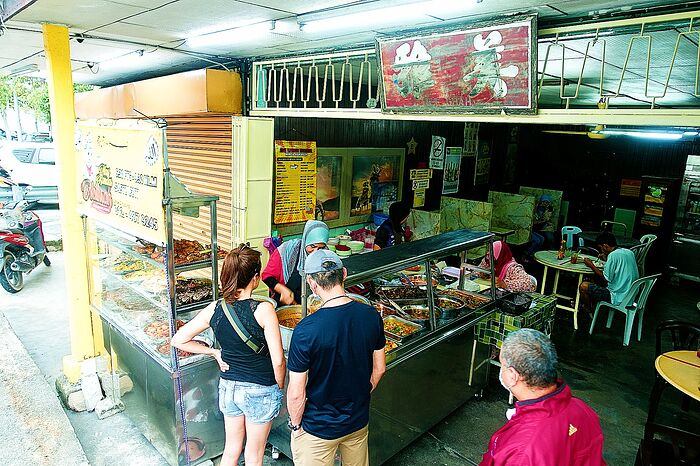In Penang, where the nasi kandar trade is traditionally dominated by Tamil-Muslim men from Ramanathapuram (Ramnad) district in Tamil Nadu, Nasi Kandar Nathrah in Teluk Kumbar goes against the grain with its all-women crew.
Located at Bee Ghah coffeeshop, Nasi Kandar Nathrah Sari is headed by owner-chef, Sari, a consummate Nasi Kandar-woman who’s ultra-polite, and incredibly neat, even as she helped each of her customers pick their choice of dishes, and expertly mixes-and-matches the gravy atop one’s plate of rice.
Bee Ghah kopitiam is more than 80 years old, owned by the Teoh family, and Nathrah Nasi Kandar has been operating there since Sari’s grandfather, Shaikh Daud’s time about 66 years ago. Upon her grandfather’s passing, the stall was passed down to his two daughters, thus starting the matriarchal lineage of Nasi Kandar Nathrah.
Sari’s mother was the elder daughter. Note that when one goes to Bee Ghah coffeeshop, one sees TWO nasi kandar stalls on either side of the coffeeshop: the one on the left is run by Sari and only opens in the evenings, 6.30pm onwards. The queue is always long, as her nasi kandar is one of the best in Penang, and tasted better than almost any other nasi kandar stall I’d ever been to.
Sari’s aunt, Kak Azizah, only operates her nasi kandar stall (Nasi Kandar Daud) located on the right-side of the coffeeshop in the mornings, from 7.30am onwards daily (no official days off, although she may close it for her own vacations). I’m told that the “morning” nasi kandar has thicker gravy than the “evening” nasi kandar.
If you’ve not found a nasi kandar stall where you can smell the aroma of its curries 100 feet away, you need to come to this one. Sari’s “daging cincang masak hitam” reminded me of the sort one gets in George Town’s old, long-gone mamak places like Ghani, Meerah or Dawood, and which old survivors like Hameediyah seemed to have lost.
The tiny, 8-decade-old Bee Ghah Coffeeshop, a 40-minutes’ drive (30 km) from George Town. It’s owned by the Teoh family who also serves traditional Hockchiew kopi, with toasted Benggali roti and homemade kaya. It’s currently managed by siblings, Mdm Teoh Goh Eng, 75, and her younger brother, Teoh Kong Chai, 66. Mdm Teoh has worked in the coffeeshop started by their parents since the age of 10.
Bee Ghah is located right next to the high-rise Lexis Hotel on Jalan Teluk Kumbar, the main street, so it’s pretty easy to find.
Address
Bee Ghah Coffeeshop
34 MK9, Jalan Teluk Kumbar, 11920 Bayan Lepas, Penang, Malaysia
Tel: +016-411 8024
Opening hours of Bee Ghah Coffeeshop: 7am to 9pm daily, except Saturdays 7am to 6pm.
Nathrah Sari’s Nasi Kandar stall operates: 6.30pm till 9.30pm daily, except Saturdays (closed).













